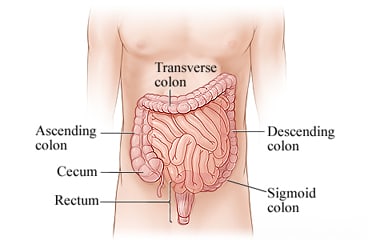
What is rectal endoscopic ultrasound?
Rectal endoscopic ultrasound is a test that lets your doctor look at the walls of your lower gastrointestinal tract. This test does not use X-rays or other radiation.
The doctor uses a thin, lighted tube that bends. It's called an endoscope, or scope. The scope has an ultrasound probe and camera at the tip. The doctor gently puts the scope into your rectum to the area to be examined. The scope can take pictures of organs and tissues to check for problems in the colon.
The procedure can take up to an hour if a sample of tissue is taken to be tested. This is called a biopsy.
You may go home after your doctor checks to make sure you are not having any problems.
How do you prepare for the procedure?
Procedures can be stressful. This information will help you understand what you can expect. And it will help you safely prepare for your procedure.
 Preparing for the procedure
Preparing for the procedure
- The day before your procedure, your doctor may ask you to drink a "colon prep" liquid. You will want to stay home, because the liquid will make you go to the bathroom a lot. The liquid will make you pass loose, watery stools. It is very important to drink all of the "colon prep" liquid.
- Be sure you have someone to take you home. Anesthesia and pain medicine will make it unsafe for you to drive or get home on your own.
- Understand exactly what procedure is planned, along with the risks, benefits, and other options.
- Tell your doctor ALL the medicines, vitamins, supplements, and herbal remedies you take. Some may increase the risk of problems during your procedure. Your doctor will tell you if you should stop taking any of them before the procedure and how soon to do it.
- If you take a medicine that prevents blood clots, your doctor may tell you to stop taking it before your procedure. Or your doctor may tell you to keep taking it. (These medicines include aspirin and other blood thinners.) Make sure that you understand exactly what your doctor wants you to do.
- Make sure your doctor and the hospital have a copy of your advance directive. If you don't have one, you may want to prepare one. It lets others know your health care wishes. It's a good thing to have before any type of surgery or procedure.
What happens on the day of the procedure?
-
Follow the instructions exactly about when to stop eating and drinking. If you don't, your procedure may be canceled. If your doctor told you to take your medicines on the day of the procedure, take them with only a sip of water.
-
Take a bath or shower before you come in for your procedure. Do not apply lotions, perfumes, deodorants, or nail polish.
-
Take off all jewelry and piercings. And take out contact lenses, if you wear them.
At the hospital or surgery center
-
Bring a picture ID.
-
You will be kept comfortable and safe by your anesthesia provider. The anesthesia may make you sleep.
-
You will lie on your left side. The doctor will put the scope in your rectum. The doctor will move the scope into your colon to the area to be examined.
-
If your doctor wants to take a sample of tissue for biopsy, the doctor may use small surgical tools. These are put into the scope to cut off some tissue. You will not feel a biopsy, if one is taken. The doctor can also use the tools to stop bleeding.
-
You may feel some bloating or cramping after the tube is moved. If you feel a lot of discomfort, tell the doctor.
-
You will stay at the hospital or surgery center for 1 to 2 hours until the medicine you were given wears off.
When should you call your doctor?
- You have questions or concerns.
- You don't understand how to prepare for your procedure.
- You're having trouble with the bowel prep.
- You become ill before the procedure (such as fever, flu, or a cold).
- You need to reschedule or have changed your mind about having the procedure.
Current as of: October 19, 2024
Author: Ignite Healthwise, LLC Staff
Clinical Review Board
All Ignite Healthwise, LLC education is reviewed by a team that includes physicians, nurses, advanced practitioners, registered dieticians, and other healthcare professionals.

